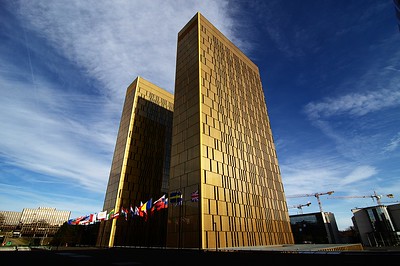European Court of Justice & Court of Auditors

1) ECJ
Quick definition
The Court of Justice of the European Union (CJEU) is one of the EU’s seven institutions. It consists of two courts of law: the Court of Justice proper and the General Court. It is responsible for the jurisdiction of the European Union. The courts ensure the correct interpretation and application of primary and secondary EU law in the EU. They review the legality of acts of the EU institutions and decide whether Member States have fulfilled their obligations under primary and secondary law. The Court of Justice also provides interpretations of EU law when so requested by national judges.
What does the CJE do?
The CJEU gives rulings on cases brought before it. The most common types of case are:
interpreting the law (preliminary rulings) – national courts of EU countries are required to ensure EU law is properly applied, but courts in different countries might interpret it differently. If a national court is in doubt about the interpretation or validity of an EU law, it can ask the Court for clarification. The same mechanism can be used to determine whether a national law or practice is compatible with EU law.
enforcing the law (infringement proceedings) – this type of case is taken against a national government for failing to comply with EU law. Can be started by the European Commission or another EU country. If the country is found to be at fault, it must put things right at once, or risk a second case being brought, which may result in a fine.
annulling EU legal acts (actions for annulment) – if an EU act is believed to violate EU treaties or fundamental rights, the Court can be asked to annul it – by an EU government, the Council of the EU, the European Commission or (in some cases) the European Parliament. Private individuals can also ask the Court to annul an EU act that directly concerns them.
ensuring the EU takes action (actions for failure to act) – the Parliament, Council and Commission must make certain decisions under certain circumstances. If they don't, EU governments, other EU institutions or (under certain conditions) individuals or companies can complain to the Court.
sanctioning EU institutions (actions for damages) – any person or company who has had their interests harmed as a result of the action or inaction of the EU or its staff can take action against them through the Court.
Composition
The CJEU is divided into 2 courts:
Court of Justice – deals with requests for preliminary rulings from national courts, certain actions for annulment and appeals.
General Court – rules on actions for annulment brought by individuals, companies and, in some cases, EU governments. In practice, this means that this court deals mainly with competition law, State aid, trade, agriculture, trademarks.
Each judge and advocate general are appointed for a renewable 6-year term, jointly by national governments. In each Court, the judges select a President who serves a renewable term of 3 years.

2) ECA
Quick definition
The European Court of Auditors (ECA) is in charge of the audit of EU finances. As the EU’s external auditor, it contributes to improving EU financial management and acts as the independent guardian of the financial interests of the citizens of the Union.
What does the ECA do?
- audits EU revenue & expenditure, to check EU funds are correctly raised, spent, achieve value for money and accounted for
- checks any person or organisation handling EU funds – including spot checks in EU institutions (especially the Commission), EU countries and countries receiving EU aid writes up findings and recommendations in audit reports, for the European Commission and national governments
- reports suspected fraud, corruption or other illegal activity to the European Anti-Fraud Office (OLAF)
- produces an annual report for the European Parliament and Council of the EU, which the Parliament examines before deciding whether to approve the Commission's handling of the EU budget
- gives its expert opinion to EU policymakers on how EU finances could be better managed and made more accountable to citizens
- also publishes opinions on preparatory legislation that will impact EU financial management, as well as position papers, reviews and ad hoc publications on EU public finance issues.
To be effective, the Court must be independent of the institutions and bodies it audits. To this end, it is free to decide on:
- what it will audit
- how to do this
- how & when to present its findings
The Court's audit work focuses mainly on the European Commission – the main body responsible for implementing the EU budget. But it also works closely with national authorities because the Commission manages most EU funds (around 80%) jointly with them.
Composition
Court members are appointed by the Council, after consulting the Parliament, for renewable 6-year terms. They choose one of their number as President for a 3-year term (also renewable).
How does the ECA work?
It carries out 3 types of audit:
- Financial audits – checking that accounts accurately present the financial position, results and cash flow for the year.
- Compliance audits – checking that financial transactions follow the rules.
- Performance audits – checking that the EU funds achieve its goals with the fewest possible resources and in the most economical manner.
The Court is divided into audit groups called 'chambers'. They prepare reports & opinions for the Court members to adopt, thus making them official.
Source: EP Website, 2023
Website(s):
Documents:
- Annual Report of the ECJ
- ESO Report: ECJ Information Guide
- Tribunal de la UE: 66 años dictando sentencias
- Public Audit in the European Union
Videos:
- Why does the Court of Justice of the EU Exist?
- How the Court of Justice works - The basics
- How the Court protects citizens' rights - Bringing a case to the ECJ
- What has the Court of Justice done for me?
- Backstage: Court fo Justice of the EU
- Court of Justice: cutting through legal fog
- More animations on the Court of Justice of the EU
- European Court of Auditors - Guardians of EU finances (Part I)
- European Court of Auditors - Guardians of EU finances (Part II)
